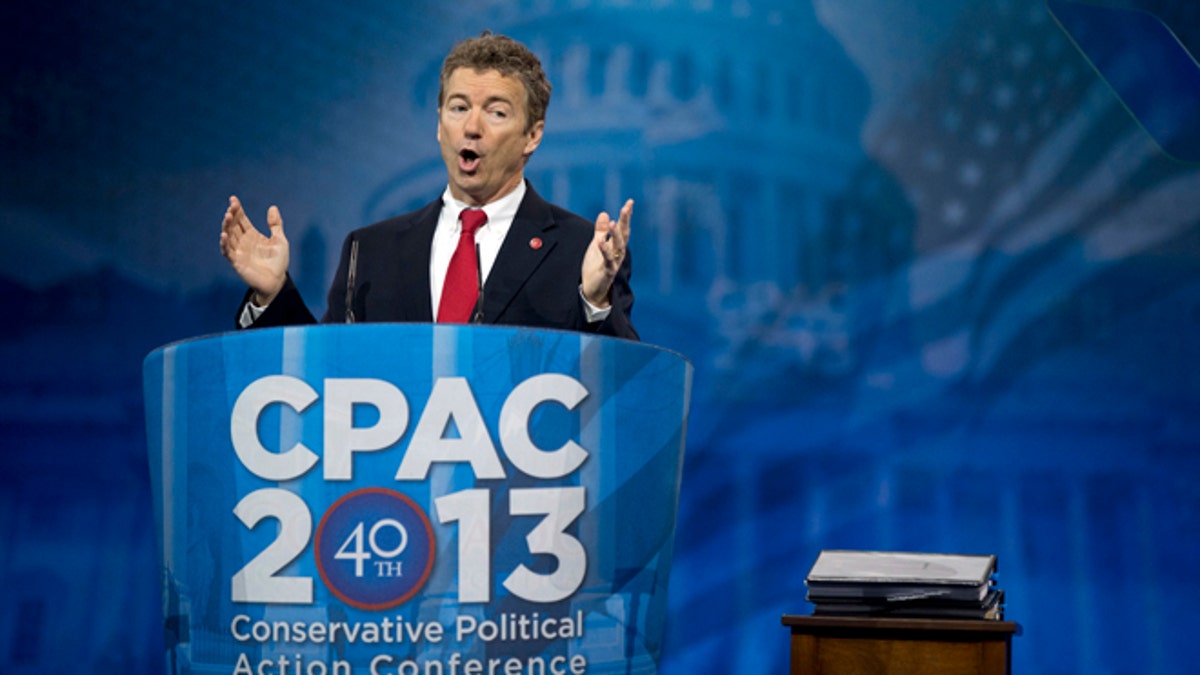
FILE: March 14, 2013: Sen. Rand Paul, R-Ky., speaks at the 40th annual Conservative Political Action Conference in National Harbor, Md. (AP)
For the umpteenth time in as many years this weekend, a member of the Paul family will win the presidential straw poll in a runaway at the Conservative Political Action Conference. But this time, the winner will not be cranky, eccentric Rep. Ron Paul, but his more politically capable son Sen. Rand Paul – who seeks to make a change instead of merely in making a point.
For three decades, the locus of the Republican Party family debate has been over social issues. Today, there is no such fight – and that’s the bad news for all of us social and foreign policy conservatives.
The central introspection for the GOP today is whether it will be a party that includes libertarians or a party dominated by them.
[pullquote]
Senate primary races over the last two cycles prove the tail is, for now, wagging the dog. These primaries, including the one that picked Rand Paul, have all had fast lanes for libertarian candidates challenging traditional, full-spectrum conservatives.
The activists who power the elevation of Sen. Paul and his ilk are corporately much less interested in the pro-life, pro-family agenda that drove the conservative movement for years, and openly hostile to the muscular foreign policy that has differentiated Republicans from Democrats since the Age of Aquarius.
Libertarian-leaning bloggers routinely lambast full-spectrum conservatives as “pro-life statists” – with one term a slur and the other merely a condescending shrug. They’re not motivated by two-thirds of the cause that animated the Reagan coalition.
Too many advance a one-note kazoo song instead of a broad-spectrum philosophy and are animated more by intra-party guerilla purges than building plausible strategies to beat Democrats.
This turn is perhaps most ironic for moderate establishment Republicans. Those elites for years turned up their noses at those of us who are social conservatives, pouting at the lack of candidates who talked only about fiscal matters and kept divisive social matters locked in the policy closet. Now they have what they said they wanted – but they may like this new animal a lot less than they liked the Reagan conservatives who dominated primaries for the thirty years.
The genesis of the transformation of the Republican primary electorate is credited to the Tea Party movement that emerged in opposition to President Obama’s first two left-wing years, but the true catalyst came under a different president. It was latent dissatisfaction with George W. Bush’s unwillingness to fight Democrats over spending and his ever-present willingness to fight overseas that really birthed the Tea Party.
There is no denying that the Republican Party and the conservative movement needed the jolt of energy and fiscal policy rigor the Tea Party’s emergence demanded. It recalibrated internal expectations on fiscal conservative purity and it drove the populist grass-roots energy that took over the U.S. House in 2010.
National media analysts have yet to fully grasp this three-dimensional and asymmetrical debate in today’s GOP. It’s easier to write the old formulaic story about Neanderthal conservatives overpowering centrist conciliators. And too many of my fellow full spectrum conservatives, addicted to the siren of pitchfork rattling from any corner, are slow to grasp the challenge.
It remains to be seen whether the GOP’s ascendant libertarian wing can become as much a force in government as it is in campaigns – or even whether they can get along with each other for very long.
The challenge for Paulites is to decide if success is changing the nature of Republican campaigns or changing the laws and government of the United States of America. Changing the former, which they’ve done, is no guarantee of changing the latter.
The task for social and foreign policy conservatives is to wake up to the new internal competition before it’s too late. Conservatism will always rely on libertarian allies but it cannot survive a libertarian takeover.
